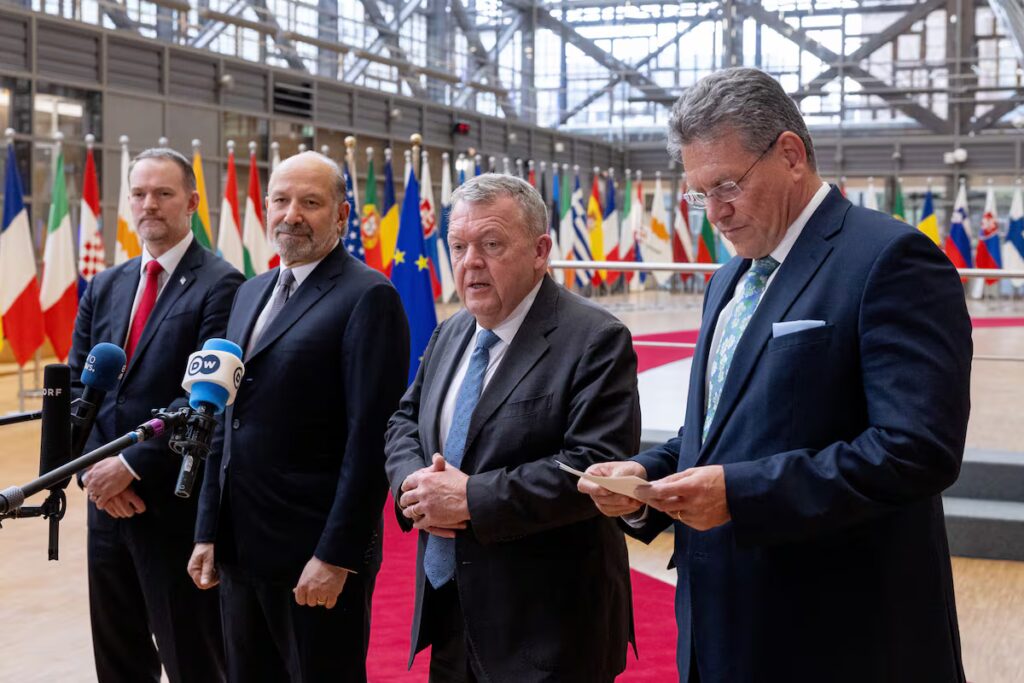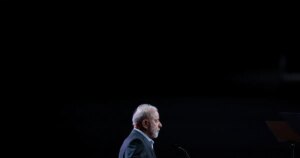
The top US trade authorities showed up in Brussels on Monday with a very clear message: if the EU wants to resolve the open dispute over tariffs on steel and aluminium, now at 50%, it must ease the impact of its digital laws. The United States believes that these regulations limit the activity of large American technology companies by imposing requirements on competition rules and content moderation. “Our suggestion is that the EU carefully considers the possibility of analyzing its digital rules and tries to achieve a balance. And if they can achieve this balanced approach, then, together with them, we will address the issue of steel,” said US Trade Secretary Howard Lutnick.
Next to the American, in the European Council building, was his European counterpart, Commissioner Maros Sefcovic, a diplomat by profession, who in his response to the press looked for a way not to upset his guest: “We just wanted to clearly assure the (trade) minister that our laws are not discriminatory. They are not aimed at American companies. But we know that this is one of the issues that the United States wants to discuss.” However, without the presence of US representatives, the sources consulted in Brussels make it clear that there is no connection between the two issues.
Lutnick didn’t just negotiate the pending issue of steel tariffs, one of the issues left out of this summer’s trade deal that established a blanket 15% tariff on European exports to the United States. He even went so far as to say that if European Internet regulations were relaxed, investments by big American tech companies in Europe could reach trillions of dollars.
From the moment Trump returned to the White House, Washington has been pressuring the EU to relax its digital rules, mainly two: the Regulation of Digital Services (DSA) and the Regulation of Digital Markets (DMA). And this Monday they did it, directly, at the headquarters of the Union, where Lutnick and the trade representative, Jamieson Greer, met Sefcovic and the EU Trade Ministers and before that the Vice President of the European Commission responsible for digital sovereignty, Henna Virkkunen.
“The United States has shown great concern for many years about the regulation of digital markets and other similar EU laws. Many times, the thresholds are set in such a way that they almost only affect American companies. The enforcement of the law is sometimes quite aggressive. The fines can be quite high,” Greer chided, between warning and clarification: “I don’t say this to be negative, but to explain a little about the US position and the challenge we see with respect to these laws.”
At the end of July, Washington and Brussels reached a deeply unfair trade deal. The United States imposed blanket tariffs of 15% without giving anything in return; on the contrary, he obtained a reduction in customs tariffs on numerous agricultural products. 50% of steel and aluminum were excluded from this agreement. Now both sides are implementing that agreement. For example, the European Commission has already passed the legal texts to reduce the rates on American agricultural products included but it has not yet been approved by the Council and Parliament.
Very productive meeting with the US Secretary of Commerce, @howardlutnickand the sales representative, @jamiesongreer in Brussels.
We discuss common priorities to strengthen business ties and open opportunities for Spanish companies in a strategic market. pic.twitter.com/qR26srUn52
— Carlos Corpo (@carlos_cuerpo) November 24, 2025
“In the short term, the biggest effort will be in the implementation of the agreement,” said Spanish Economy and Trade Minister Carlos Body. And on that side, as well as on that of steel, important elements of uncertainty remain. The EU wants to focus above all on the latter: on the overcapacity of production installed throughout the world, especially in China; in reducing the tariff by 50%; and that Washington does not include steel products among those affected by that high rate.
But in exchange for this request from Brussels, the Trump administration is demanding that pressure on big tech companies be eased both in regulation and in some specific open cases. The European response is not outright rejection in the public statement, but the usual reminder that “the EU is open to discussing all concerns with partners, but this does not change the fact that Europe has the sovereign right to legislate”.
In addition to meeting with all EU ministers, Lutnick and Greer met in a bilateral meeting with Carlos Body. At that meeting, the Spaniard took the opportunity to ask for both a solution to the steel market problem and a tariff exemption for olive oil exported to the United States. “Only 2% of the olive oil sold on the US market is produced there,” explains the Spanish minister to justify his request, arguing that the elimination of this tax would lead to a drop in prices for North Americans.





